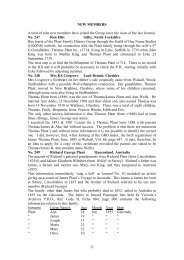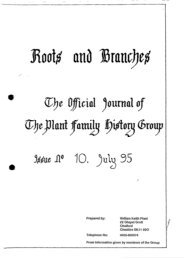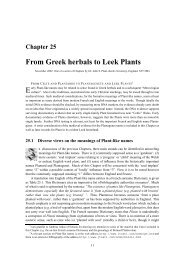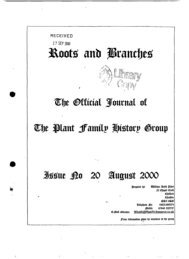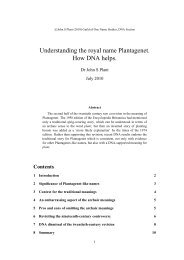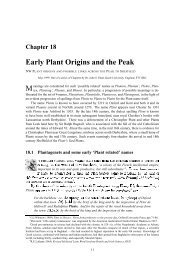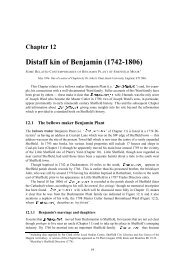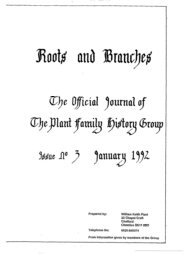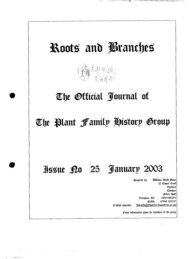Chapter 34 Austin Plant - Plant Family History Group
Chapter 34 Austin Plant - Plant Family History Group
Chapter 34 Austin Plant - Plant Family History Group
Create successful ePaper yourself
Turn your PDF publications into a flip-book with our unique Google optimized e-Paper software.
William Plente (1272-84) 123 in Norfolk records, perhaps all the same person. The loss of inflexion<br />
endings similar to the –e of Plente or <strong>Plant</strong>e or Plonte occurred later in the South West dialect region<br />
than in the West Midlands 124 where the spelling Plonte is mostly found. Hence, it could have been<br />
that it was the same name that developed into Plenty in the South West dialect region but <strong>Plant</strong> in the<br />
West Midlands. It is mainly in Somerset that the surname Plenty (a possible respelling of Plente) is<br />
now clustered. The Plente name may have originated with an ‘abundance’ or ‘fertility’ meaning 125 ;<br />
and then austere sentiments 126 could have led, by the mid-thirteenth-century, to an incentive to<br />
ameliorate the spelling of Plente to a less extravagant meaning; this could have produced <strong>Plant</strong>e and<br />
its dialect equivalent Plonte, though the spelling Plente is known to have survived outside the West<br />
Midlands into the fourteenth century 127 .<br />
It has not yet been DNA tested whether Plenty belongs to the same male-line family as <strong>Plant</strong> or<br />
whether this relates to similar names overseas. A notable Plente in the South West was the king’s<br />
minister in Devon, Roger Plente 128 , who for example, in 1364, was licensed ‘to take 20 packs of<br />
cloth of divers colours from the port of Exeter to Gascony, Spain, and other parts beyond seas;<br />
and to return with wine and other merchandise to the ports of London, Suthampton, Sandwich or<br />
Exeter’. It is not yet clear whether this relates to a cluster of the name spelling <strong>Plant</strong>e (817) or <strong>Plant</strong>ie<br />
(102) or <strong>Plant</strong>y (105) in modern Gascony, though recent advances in Y-DNA testing offer improved<br />
prospects for investigating the possible travels of single families despite possible variations in the<br />
spellings of their names.<br />
Most names have not yet been Y-DNA tested and there are, for example, no results to report for<br />
such names as <strong>Plant</strong>e in Spain (32), or the noble name <strong>Plant</strong>a in Switzerland (52), or the English<br />
name Somerset which is said to descend down intact male lines from the noble ‘<strong>Plant</strong>agenets’ (Beauforts).<br />
So far it can only be added that the initial Y-DNA results indicate that a French-Canadian<br />
<strong>Plant</strong>e family 129 is genetically distinct from the main English <strong>Plant</strong> family 130 .<br />
In short, it is possible that there may have been some cultural influence from the <strong>Plant</strong>e Genest<br />
nickname but there is no evidence that the <strong>Plant</strong>s were genetically related to the <strong>Plant</strong>agenets. It is<br />
possible that the English <strong>Plant</strong>s began with an ‘abundant’ or ‘fertile’ meaning to their name, with<br />
the spelling Plente, and that this had been influenced by a ‘hairy shoot’ meaning to <strong>Plant</strong>e Genest.<br />
Though the nature of this influence may not seem immediately clear, a medieval study reveals that<br />
there was a metaphysical connection, since the plant powers (i.e. vegetable soul) of a ‘hairy shoot’<br />
(<strong>Plant</strong>agenet) brought forth the plenty (Plente) of growth and offspring. Then, with the spelling<br />
<strong>Plant</strong>e or Plonte, the meaning of Plente could have been sanitised to ‘offspring’, if that was not<br />
indeed the meaning of the <strong>Plant</strong> surname from its outset for this family.<br />
123<br />
Norwich Cathedral Charters.<br />
124<br />
J.A. Burrow and T. Turville-Petre (1992) op. cit., pp. 3-4, 6-7, 20-21.<br />
125<br />
The MED defines plente as an alternative spelling of plaunt(e) or 1(a) abundance, prosperity, wealth; also, the<br />
goddess of abundance; ... [(b), (c), (d), (e), (f), (g) similar meanings] ... (h) fertility, productivity, fruitfulness; abundant<br />
production of crops, profusion of flowers; (i) generosity, bounty; 2(a) fullness, completeness, perfection; 2(b) full measure<br />
or number; totality; 2(c) satiety, satisfaction; 3 a projection of the extremity of a bone structure, Also, as an adjective:<br />
abundant, plentiful.<br />
126<br />
Both abundance and sexuality were renounced by the Franciscan ‘spirituals’ as well as the Cistercians. For example,<br />
the austere Joachim of Calabria (c1135-1202) became one of the most respected religious figures by the thirteenth century.<br />
Haft, White and White, The Key to “The Name of the Rose” (Ann Arbor, 1999), pp. 68-69).<br />
127<br />
e.g. John Plente, vicar of the cathedral church of Chichester, Patent Rolls 1<strong>34</strong>3; John Plente, witness at Theydene<br />
Boys, Close Rolls 1<strong>34</strong>3; Reynold Plente, Cornwall, Close Rolls 1393.<br />
128<br />
Patent Rolls 1364; Fine Rolls 1364; Patent Rolls 1365; Patent Rolls 1367; Patent Rolls 1368.<br />
129<br />
So far, only four members of this family have been Y-DNA tested of which three match each other but are genetically<br />
distinct from the main English <strong>Plant</strong> family.<br />
130<br />
So far twenty <strong>Plant</strong> males from England and North America have been Y-DNA tested of which eleven match, including<br />
two with the name spelling <strong>Plant</strong>t. When half or more match, the name can be said to be a single-family surname.<br />
Those that do not match can be expected to have descended, at some stage down the centuries, through a false paternity<br />
event (i.e. an event involving the adoption of the <strong>Plant</strong> surname though the true father was not a <strong>Plant</strong>).<br />
60



